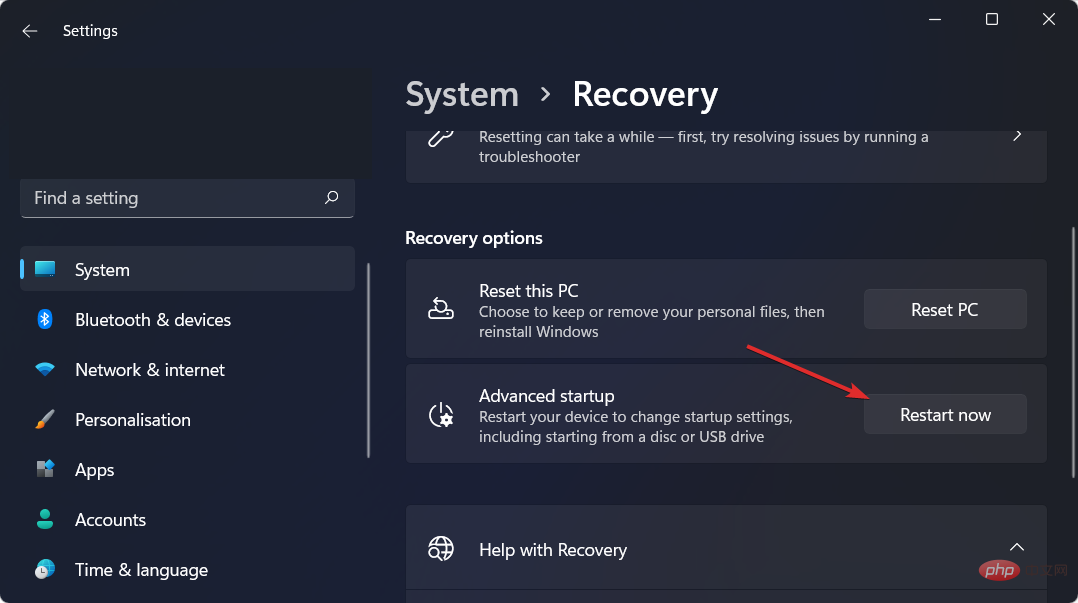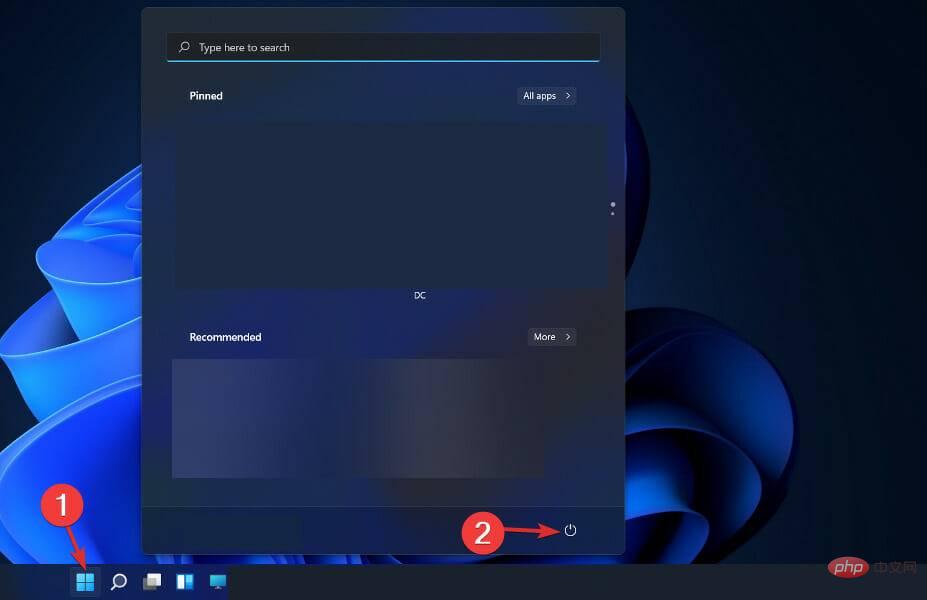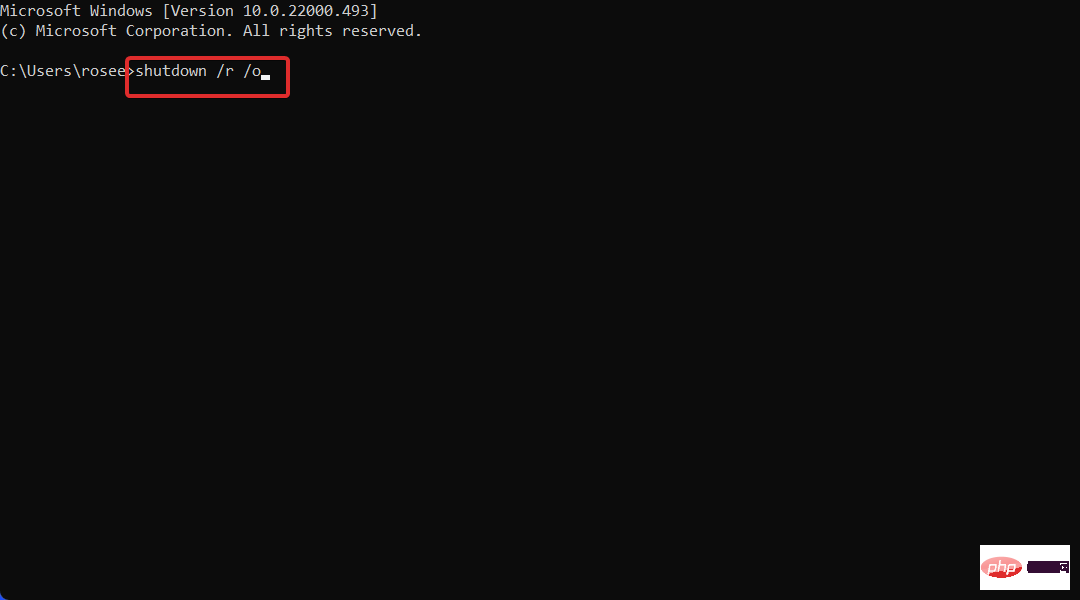How to enter recovery mode in Windows 11
Recovery mode is a great tool for users who often face computer problems as it helps them diagnose the issues that cause the system to malfunction or throw error messages, so we will show you how to enter recovery mode today In Windows 11.
Users can boot their computers into recovery mode, providing a more streamlined experience by deactivating certain programs and drivers.
This provides a better experience for those trying to figure out what's wrong with their computer. After we take a closer look at what it is, we'll walk you through the process of entering recovery mode in Windows 11.
What does recovery mode do?
Recovery Mode makes it possible to debug, repair and restore your system, a recovery environment (WinRE) with many advanced boot options.

More specifically, recovery mode in Windows 11 inherits most of the recovery options from previous operating systems, such as:
- Startup Repair - Check and correct problems that prevent Windows from loading.
- System Restore - If your computer encounters a system failure, you can restore it to a previous restore point.
- System Image Recovery - Restore your computer from a previously taken system image backup.
- Command Prompt - Advanced troubleshooting can be accomplished by using various command line options.
- Startup Settings - Change how Windows starts and see if it helps with debugging.
For more information on what these Windows 11 recovery methods do, check out Microsoft's page on the topic. If all you really want to do is enter it, all you have to do is follow one of the methods below.
How to enter recovery mode in Windows 11?
1. Go to the
Settings- application via Settings
-
and navigate to Recovery under the System section.

- Here you need to click on the Restart now button next to Advanced startup. That’s all! Your PC will enter recovery mode.

If you want to clean your computer partition, you should use specialized tools to process your computer files. Our recommendation won't disappoint you.
2. Press F11 when the system starts
This is one of the most basic methods to enable recovery mode. F11Users can press the key immediately after booting to enter recovery mode.
However, it should be noted that this strategy may not be compatible with all PCs. Some people may be using the F9 or F12 keys, so check with the PC manufacturer to make sure this is the case.
3. Restart and press Shift
- Click the Start icon and then click thePower button.

- Hold down the Shift button and click Restart Now. That’s all! You will now be redirected to the recovery mode menu.
4. Enter the command prompt using CMD
- as mentioned below:

- Now type or copy-paste the following command and let it run. You will be redirected to the recovery mode menu:
<strong>shutdown /r /o</strong>
You may find yourself resolving a need in safety Issue with restarting the computer multiple times in mode. It could get very cumbersome if you had to go through the entire method we just described every time you restarted your computer.
The System Configuration tool included with Windows provides the opportunity to enable the Secure Boot option for your computer. This essentially forces Windows to boot into Safe Mode every time you restart your PC.
The above is the detailed content of How to enter recovery mode in Windows 11. For more information, please follow other related articles on the PHP Chinese website!

Hot AI Tools

Undresser.AI Undress
AI-powered app for creating realistic nude photos

AI Clothes Remover
Online AI tool for removing clothes from photos.

Undress AI Tool
Undress images for free

Clothoff.io
AI clothes remover

Video Face Swap
Swap faces in any video effortlessly with our completely free AI face swap tool!

Hot Article

Hot Tools

Notepad++7.3.1
Easy-to-use and free code editor

SublimeText3 Chinese version
Chinese version, very easy to use

Zend Studio 13.0.1
Powerful PHP integrated development environment

Dreamweaver CS6
Visual web development tools

SublimeText3 Mac version
God-level code editing software (SublimeText3)

Hot Topics
 What is the reason why PS keeps showing loading?
Apr 06, 2025 pm 06:39 PM
What is the reason why PS keeps showing loading?
Apr 06, 2025 pm 06:39 PM
PS "Loading" problems are caused by resource access or processing problems: hard disk reading speed is slow or bad: Use CrystalDiskInfo to check the hard disk health and replace the problematic hard disk. Insufficient memory: Upgrade memory to meet PS's needs for high-resolution images and complex layer processing. Graphics card drivers are outdated or corrupted: Update the drivers to optimize communication between the PS and the graphics card. File paths are too long or file names have special characters: use short paths and avoid special characters. PS's own problem: Reinstall or repair the PS installer.
 How to speed up the loading speed of PS?
Apr 06, 2025 pm 06:27 PM
How to speed up the loading speed of PS?
Apr 06, 2025 pm 06:27 PM
Solving the problem of slow Photoshop startup requires a multi-pronged approach, including: upgrading hardware (memory, solid-state drive, CPU); uninstalling outdated or incompatible plug-ins; cleaning up system garbage and excessive background programs regularly; closing irrelevant programs with caution; avoiding opening a large number of files during startup.
 How to solve the problem of loading when PS is always showing that it is loading?
Apr 06, 2025 pm 06:30 PM
How to solve the problem of loading when PS is always showing that it is loading?
Apr 06, 2025 pm 06:30 PM
PS card is "Loading"? Solutions include: checking the computer configuration (memory, hard disk, processor), cleaning hard disk fragmentation, updating the graphics card driver, adjusting PS settings, reinstalling PS, and developing good programming habits.
 Is slow PS loading related to computer configuration?
Apr 06, 2025 pm 06:24 PM
Is slow PS loading related to computer configuration?
Apr 06, 2025 pm 06:24 PM
The reason for slow PS loading is the combined impact of hardware (CPU, memory, hard disk, graphics card) and software (system, background program). Solutions include: upgrading hardware (especially replacing solid-state drives), optimizing software (cleaning up system garbage, updating drivers, checking PS settings), and processing PS files. Regular computer maintenance can also help improve PS running speed.
 How to solve the problem of loading when the PS opens the file?
Apr 06, 2025 pm 06:33 PM
How to solve the problem of loading when the PS opens the file?
Apr 06, 2025 pm 06:33 PM
"Loading" stuttering occurs when opening a file on PS. The reasons may include: too large or corrupted file, insufficient memory, slow hard disk speed, graphics card driver problems, PS version or plug-in conflicts. The solutions are: check file size and integrity, increase memory, upgrade hard disk, update graphics card driver, uninstall or disable suspicious plug-ins, and reinstall PS. This problem can be effectively solved by gradually checking and making good use of PS performance settings and developing good file management habits.
 Is PS slow loading related to other programs that are running?
Apr 06, 2025 pm 06:03 PM
Is PS slow loading related to other programs that are running?
Apr 06, 2025 pm 06:03 PM
The secrets to mastering Office software include: understanding different versions and platforms, correctly installing and configuring, proficient in using the software interface, in-depth understanding of feature operations, application collaboration and sharing functions, utilizing templates and styles, mastering advanced skills, and solving common problems. In addition, you need to choose a version that suits your needs, make good use of templates and styles, develop backup habits, and learn shortcut keys and advanced techniques to improve efficiency.
 How to solve the problem of loading when PS is started?
Apr 06, 2025 pm 06:36 PM
How to solve the problem of loading when PS is started?
Apr 06, 2025 pm 06:36 PM
A PS stuck on "Loading" when booting can be caused by various reasons: Disable corrupt or conflicting plugins. Delete or rename a corrupted configuration file. Close unnecessary programs or upgrade memory to avoid insufficient memory. Upgrade to a solid-state drive to speed up hard drive reading. Reinstalling PS to repair corrupt system files or installation package issues. View error information during the startup process of error log analysis.
 Does mysql need the internet
Apr 08, 2025 pm 02:18 PM
Does mysql need the internet
Apr 08, 2025 pm 02:18 PM
MySQL can run without network connections for basic data storage and management. However, network connection is required for interaction with other systems, remote access, or using advanced features such as replication and clustering. Additionally, security measures (such as firewalls), performance optimization (choose the right network connection), and data backup are critical to connecting to the Internet.










